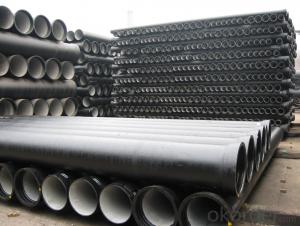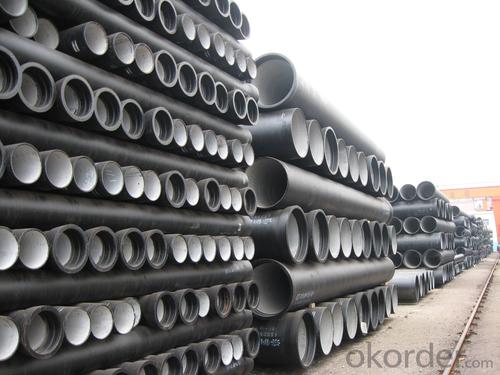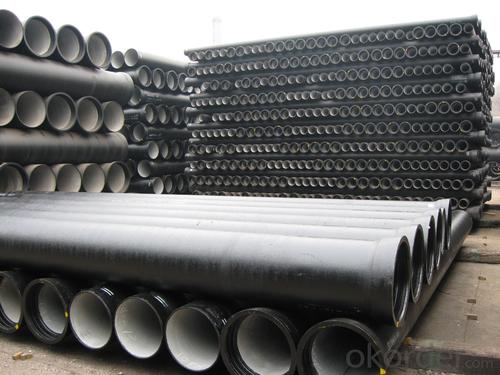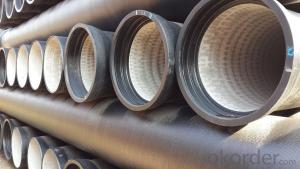Ductile Iron Pipe DN600
OKorder Service Pledge
Quality Product, Order Online Tracking, Timely Delivery
OKorder Financial Service
Credit Rating, Credit Services, Credit Purchasing
You Might Also Like
Specifications
Quick Details
| Place of Origin: | China (Mainland) | Brand Name: | CMAX | Model Number: | T type / K type / Flange type |
| Length: | 6m / 5.7m / Negotiable | Standard: | ISO2531 / EN545 / EN598 | Application: | Potable / Sewage water |
| Diameter: | DN80~DN2200 | Shape: | Round | Hardness: | 230 |
| Pipe Wall Thickness: | standard | Pull Strength: | 420 | Yield (≥ MPa): | 300 |
| Material: | Ductile Iron | Type: | Centrifugal ductile cast iron pipe | Certification: | ISO2531 / EN545 / EN598 |
| Outer Diameter: | 80-2200 | Thickness: | standard | Specification: | DN80~DN2200 |
| |
The advantages to the customer:
Trustworthy financial strength.
One-stop shopping.
Fast and efficient service.
Coordination of shipments from multiple plants.
Specialists of the overseas shipping process.
A more competitive price.
- Q: Can ductile iron pipes be used for irrigation systems in saline soil conditions?
- Ductile iron pipes, due to their durability and corrosion resistance, can be utilized for irrigation systems in saline soil conditions. These pipes are renowned for their ability to withstand various soil conditions, including saline soil, which is characterized by elevated salt levels that can lead to corrosion and material deterioration. However, ductile iron pipes possess a protective coating, such as cement mortar lining or polyethylene encasement, that provides an added layer of defense against corrosion. Consequently, they can endure the corrosive impacts of saline soil and maintain their structural integrity for an extended duration. Moreover, ductile iron pipes exhibit a high tensile strength, enabling them to resist cracks and breaks, which is crucial for irrigation systems necessitating a consistent and dependable water supply. Consequently, ductile iron pipes represent a viable option for irrigation systems operating in saline soil conditions.
- Q: How does ductile iron pipe perform in high-temperature steam applications?
- Ductile iron pipe performs well in high-temperature steam applications due to its inherent strength and ability to withstand thermal stress. Its high melting point and resistance to corrosion make it a reliable choice for transporting steam at elevated temperatures. Additionally, ductile iron's thermal conductivity helps to dissipate heat efficiently, ensuring the pipe's integrity and preventing potential failures.
- Q: Can ductile iron pipes be used for water tunnel crossings?
- Yes, ductile iron pipes can be used for water tunnel crossings. Ductile iron is a strong and durable material that can withstand the pressure and load requirements of water tunnel crossings. Its corrosion resistance and flexibility make it suitable for underground installations, ensuring the safe and efficient transport of water.
- Q: What is the average diameter range of ductile iron pipes?
- The average diameter range of ductile iron pipes can vary depending on the specific application and industry standards. However, in general, ductile iron pipes are available in a wide range of diameters to meet various requirements. Commonly, the average diameter range for ductile iron pipes can start from as small as 4 inches (100 mm) and go up to 64 inches (1600 mm) or even larger. These sizes are often used for water distribution, sewer systems, and other infrastructure projects. It is important to note that the specific diameter range of ductile iron pipes can be influenced by factors such as local regulations, project specifications, and engineering considerations. Therefore, it is recommended to consult industry standards and relevant authorities to determine the appropriate diameter range for a specific application.
- Q: Can ductile iron pipe be used for pump stations?
- Yes, ductile iron pipe can be used for pump stations. Ductile iron pipe is a commonly used material for underground water and wastewater systems, including pump stations. It offers several advantages such as high strength, durability, and corrosion resistance, making it suitable for such applications. Additionally, ductile iron pipe is compatible with various types of pumps and is known for its long service life, making it an ideal choice for pump station projects.
- Q: Ductile iron pipe connection mode
- Main points of installation: (1) clean the pipe mouth: clean all the sundries in the mouth. Second, clean aprons, aprons on the adhesive material on the apron: clean up, put the ring bending "plum blossom" or "8" shaped into a socket groove, and hand along the entire ring press again, or with a rubber hammer, to ensure that each part of the warping apron is not twisted, evenly the card in the slot.
- Q: What is the minimum operating temperature for ductile iron pipes?
- Ductile iron pipes typically have a minimum operating temperature of -40 degrees Celsius, showcasing its exceptional strength and ductility in cold conditions. This makes it a versatile option for various purposes, such as water and wastewater systems. Nevertheless, it is crucial to acknowledge that the specific minimum operating temperature may differ based on factors such as the grade of ductile iron employed and the requirements of the application. It is highly advisable to refer to the manufacturer's specifications and guidelines for the appropriate utilization and optimal performance of ductile iron pipes in cold temperatures.
- Q: How are ductile iron pipes protected during transportation and storage?
- Ductile iron pipes are typically protected during transportation and storage through various methods. One common practice is to apply a coating of bituminous paint or epoxy on the exterior surface of the pipes to prevent corrosion. Additionally, the pipes are often wrapped with plastic or other protective material to shield them from physical damage and moisture. Proper handling and stacking techniques are also employed to minimize the risk of any deformation or cracking during transportation and storage.
- Q: Can ductile iron pipe be used for marine applications?
- Yes, ductile iron pipe can be used for marine applications. It is corrosion-resistant and has high strength, making it suitable for various marine environments and applications such as underwater pipelines, dock construction, and seawater intake systems.
- Q: Can ductile iron pipe be used for stormwater systems?
- Yes, ductile iron pipe can be used for stormwater systems. It is a suitable material choice due to its strength, durability, and resistance to corrosion, making it capable of withstanding the demands of stormwater drainage systems.
Send your message to us
Ductile Iron Pipe DN600
OKorder Service Pledge
Quality Product, Order Online Tracking, Timely Delivery
OKorder Financial Service
Credit Rating, Credit Services, Credit Purchasing
Similar products
Hot products
Hot Searches
Related keywords



























